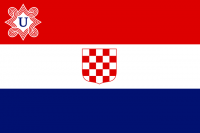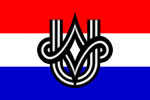Croatia

| |
| Languages | |
| Official | Croatian |
| Other | Slovenian, Dalmatian, Serbian, Hungarian |
| Religion | |
| State | Latin Rite Catholicism |
| Other | Orthodox Christianity, Protestantism, Judaism, Eastern Catholicism (Uniatism), Sunni Islam |
| Capital | Ousěk (Osijek) |
| Important Cities | Zagreb, Rijeka, Pula, Ljubljana, |
| Government Type | Republic (nominally) Dictatorship (actually) |
| Regent | Tomislav Paveliť |
| President | Krunoslav Tomiť |
| Area | |
| Population | 5,538,500 (2020 estimate; including occupied Slovenia) |
| Republic Established | 1999 |
| Currency | Kúna |
| Organizations | |
| Major sports | Football |
Croatia was the main "aggressor" in the Great Balkan War. Since the CSDS was dominated by Croats and the majority of the army was Croats, they attempted to keep the territory of the CSDS together by force after Bulgaria became the first member state to declare independence.
Bulgaria declared independence in 1988 and immediately aligned itself with SNORist Russia, thus guaranteeing its independence; the Croat-dominated Danubian Peoples' Army (DPA) units stationed there withdrew in a 9-day "war".
In 1989, the son of the Ustasha leader Ante Paveliť, Tomislav, returned from Helvetia to Croatia to re-establish the Ustasha movement which his father led in Croatia during GW2. After GW2 ended and the communists led by Josip Broz won the ensuing civil war and establishing the CSDS, Ante was forced to flee, and he settled in Helvetia, where he died peacefully in 1959. After their return, Tomislav's son Žeľko organised paramilitary units that were quite brutal. Tomislav Paveliť became the leader of the new Ustasha party, and he became close with then-CSDS President Fraňo Tuďman.
It was only after Dalmatia declared independence in 1990 that the war started for real. The DPA was sent in by CSDS president Fraňo Tuďman, so Dalmatian Territorial Defence units became the Dalmatian Army and fought back. Shortly thereafter Serbia declared independence too, and the Croats were thus fighting on two fronts. The Croats were backed with arms and funds during this time by Germany and Helvetia, and to a lesser extent, Austria. While Croatia was fighting only Dalmatia, a few shipments of arms arrived from SNOR-ist Russia, but after Serbia declared independence these shipments stopped.
In 1994, the remnants of the CSDS, dominated by Croatia, were reorganized. In an attempt to stave off separatism in Istria, the peninsula was separated from the Soviet Republic of Slovenia and made an equal member of the CSDS.
In 1995, in the region of Croatia immediately to the east of Osijek and to the north of there was also declared a Serb state called Republic of Serb Slavonia with capital at Vukovar. Subsequently the RSS was annexed to the Serbian Kingdom in 1998 and was retaken by Croatia in 1999 when the Serbs were occupied with Sanjak in the south.
In 1996 Slovenia declared independence, but their state didn't last long, having been quickly crushed by the Croats. Also in 1996 Tuďman died, and Tomislav Paveliť became president and he orchestrated the crushing of Slovenia and the retaking of Serb Slavonia, which had been incorportated into the Kingdom of Serbia in 1998 but had been declared an independent state already in 1995. In 1999 there was a restructuring of the government which resulted in Paveliť becoming a very influential figurehead as regent, and Krunoslav Tomit' was 'elected' president (there were only Ustasha candidates) in 2000.
Istria's attempt at independence was even more abortive. Its government announced that it was leaving the CSDS in 1998 but could find no foreign nation to recognize it. Croatia quickly quelled the movement, and Istria's autonomous status was abolished in the 1999 restructuring. Croatia annexed the peninsula outright, in the process acquiring a coastline and several ports.
Croatia is bordered by Dalmatia, Serbia, Hungary, Austria, Italy
Religion
Population: 5,538,500
- Christian (84.77%): 4,694,986
- Catholic (63.09%): 3,494,240
- Latin Rite 98.77%: 3,451,222
- Uniate 1.23%: 43,018
- Orthodox Christian (12.78%): 707,820
- Protestant (8.9%): 492,928
- Catholic (63.09%): 3,494,240
- Irreligion (11.13%): 616,434
- Islam (1.47%): 81,416
- Judaism (.73%): 40,344
- Other (1.9%): 105,232
Source: [1]
See Also: Croatian






